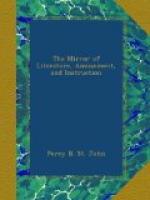Its real disposition is, however, very far from peaceable: it preys with great rapacity on smaller insects, for which it lies in wait, in the first mentioned posture, till it siezes them with a sudden spring, and devours them. It is, in fact, of a very ferocious nature; and when kept with another of its own species, in a state of captivity, will attack its fellow with the utmost violence, and persevere till it has killed its antagonist. Roesal, a naturalist, who kept some of these insects, observes, that in their mutual conflicts, their manoeuvres very much resemble those of hussars fighting with sabres; and sometimes the one cleaves the other through, or severs the head from its body with a single stroke. During these engagements the wings are generally expanded, and when the battle is over, the conqueror devours his vanquished foe.
Among the Chinese, this quarrelsome disposition in the Mantis, is converted to an entertainment, resembling that of fighting-cocks and quails: and it is to this insect that we suppose the following passage in Mr. Barrow’s Account of China, alludes:—“They have even extended their inquiries after fighting animals into the insect tribes, and have discovered a species of locusts that will attack each other with such ferocity, as seldom to quit their hold without bringing away at the same time a limb of their antagonist. These little creatures are fed and kept apart in bamboo cages; and the custom of making them devour each other is so common, that during the summer months, scarcely a boy is to be seen without his cage of locusts."[3]
[3] Travels in China.
The country people in many parts of the continent, look upon the religious Mantis as a divine insect, and would not on any account injure it. Dr. Smith, however, informs us, that he received an account of this Mantis, that seemed to savour little indeed of divinity. A gentleman caught a male and female, and put them together in a glass vessel. The female, which in this, as in most other insects, is the largest, after a while, devoured, first the head and upper parts of her companion, and afterwards the remainder of the body.[4] Roesel, wishing to observe the gradual progress of these creatures to the winged state, placed the bag containing the eggs in a large enclosed glass. From the time they were hatched they were very savage. He put various plants into the glass, but they refused them, in order to prey upon each other. He next tried insect food, and put several ants into the glass to them, but they then betrayed as much cowardice as they had before done of barbarity; for the instant the Mantes saw the ants, they attempted to escape in every direction. He next gave them some common house flies, which they seized with eagerness in their fore claws, and tore in pieces; notwithstanding this apparent fondness for flies, they continued to destroy each other. Despairing at last, from their daily decrease, of rearing




